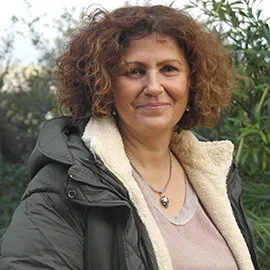Acquiring recognized and operational expertise in plant breeding and crop diversity
|
What type of training ? |
une formation diplômante, sous statut étudiant |
|---|---|
|
For who ? |
student with a French diploma, international student, employee or job seeker |
|
Where ? |
L'Institut Agro Montpellier - La Gaillarde Campus |
Objectives
To adapt agriculture to global changes while preserving the diversity of living organisms, it is essential to mobilize technological innovation for crop improvement, in the North as well as in the South.
The Selection and evolution of Mediterranean and tropical plants specialization trains scientists in genetics and plant engineering for careers in seed, genetic resource management and academic research sectors.
Through the programme, students acquire:
- expertise in genetics, plant breeding and modelling, taking into account major technological advances from the public and private research communities that are partners of the training programme
- solid understanding of data analysis using an operational teaching approach focussing on projects
- innovative tools for measuring and interpreting traits that enable plants to cope with biotic and abiotic environmental constraints in crop environments
- a multi-faceted vision of how the seed sector and its professional actors operate, from farmer seed networks to more industrial agriculture
- elements to develop a position as an expert and a citizen on ethical and regulatory debates regarding biodiversity management, farmers’ rights, intellectual property rights and the use of methods to modify living organisms.
These skills are acquired through diversified teaching:
- courses and seminars given by professors and researchers from partner communities
- regular meetings with professionals during study tours and interventions
- tutorials and workshops applied to data sets obtained by the latest genome access, phenotyping and modelling technologies
- projects linking professional actors of the different sectors concerned
- end-of-studies internship based on an individual applied research project in the private or public sector.
The specialization thus leads to investing in plant diversity and innovation for the development of more sustainable agriculture.
Themes
- agronomy, agroecology
- agriculture and rural development, farms and farm organizations
- Mediterranean and tropical countries
- natural resources, environment, territories
-
Programme
Number of ECTS credits : 60
Language of instruction : In French
The first semester programme consists of 4 teaching units. The theoretical training is followed by a 6-month practical internship.
Particular emphasis is placed on:
- plant genomics, genetic diversity of cultivated plants, in situ and ex situ conservation, traits of abiotic stress tolerance and resistance to biotic agents
- breeding and improvement of varieties, including farmers’ varieties for the organic sector or traditional agriculture, quantitative genetics, role of biotechnology, organization and regulation of the seed and plant sector
- tools required for plant breeding (biostatistics, bioinformatics, modelling)
- basics in soft-skills and management and communication techniques; a group prospective study on the seed sector completes the training.
Internships
A 6-month internship (March - September, 30 ECTS, compulsory) completes the training. It aims to enhance the knowledge and working methods acquired during the course and enable students to gain operational experience and expertise in the mentioned professional fields. In general, the internship involves an autonomous applied research project involving a strong data analysis component.
The internship is preferably done in a public research unit, in France or abroad, depending on the student's career plans. According to the student’s project, the internship can be done in a private company. The internship master’s thesis is orally defended in mid-September before a jury composed of SupAgro teachers, public researchers and private sector professionals, and also possibly academic staff from the student's home university A pre-defence may be organized at the end of June to allow the student to apply for PhD grant during the French doctoral school competition.
-
Calendar
- From 6 Sept. 2021 to 7 March 2022: classes
- From 8 March 2022: start of the compulsory internship (6 month)
-
Admission
For students applying to the Selection and evolution of Mediterranean and tropical plants specialization in the second year (M2), taking the Master 1 (Semester 7 – Major: Towards sustainable agriculture, Semester 8 - Option: Plant Sciences) is strongly recommended to acquire the prerequisites and deepen basic knowledge of agronomy, ecophysiology, genetics and genomics, modelling and statistics. Exceptions may be considered on a case-by-case basis depending on the proven level of the student.
The training is open to foreign students holding at least a Master 1 level degree in the fields of plant biology and agronomy, with solid prerequisites in plant sciences.
-
Careers
Employers
- Private plant breeding companies, partners and plant breeding service providers
- Seed and plant producing establishments
- Farmers’ seed networks
- Technical crop institutes
- Professional or inter-professional organizations in the seed and plant sector
- French or foreign public research and higher education establishments
- International organizations for agronomic research and plant breeding and diversity
- Access to certain job openings is facilitated by pursuing a PhD
Jobs
Positions oriented around plant breeding:
- Plant breeder
- Pre-breeder, trait breeder
- Project leader
- Supporting functions to plant breeding: production of genotyping data, production of phenotyping data, bio-statistics, bioinformatics
- Laboratory manager
- Facilitator in collaborative research, research officer
And also… Public sector researcher and positions within higher education establishments (lecturer, assistant professor, professor).
Jobs oriented around plant sectors:
- Seed production manager (seed firms)
- Modelling and decision support tools
- Quality / certification / protection of new varieties manager
- Product manager, development engineer
- Sales manager
- Research / mission manager in seed inter-professional organizations
Director of studies
Partners
- Private sector companies, partner companies and service providers
- Research units of the Montpellier agronomic research community: AGAP, DIADE, LEPSE, BGPI, BPMP, CEFE
- Outside Montpellier: GAFL Avignon, GDEC Clermont Ferrand, Quantitative Genetics and Evolution (GQE - Le Moulon), etc.
- Research institutes: CIRAD, IRD, INRAE, CNRS
- Groups / Associations or networks of actors and seed unions: GNIS, ASF, UFS, Réseau Semences Paysannes...
- Agropolis International scientific community
- Consultative Group on International Agricultural Research - CGIAR
Place
L'Institut Agro Montpellier
Campus de La Gaillarde
2 place Pierre Viala
34060 Montpellier - France
Registration
Key features
- Field expertise: plant biology, plant genetics and breeding
- Large data set analysis and modelling
- Skills and perspectives to contribute to sustainable agriculture
- Responsibility for agricultural development models
- High impact on advances in agriculture in interaction with other disciplines
- Immediate employability in a sector that is constantly innovating
- Possibility to continue with a PhD
- Internationally oriented jobs
Fees
- Complete programme (M1 + M2): €10,700 for the two years (M1: €5,600 and M2: €5,100) + €105 Contribution Vie Etudiante et de Campus (CVEC) administrative fee
- Direct admission in the 2nd year (M2): €5,800 + €105 Contribution Vie Etudiante et de Campus (CVEC) administrative fee
Contacts
-
-

Florence MARCHAL
Assistant
- Department of Biology and Ecology
- L'Institut Agro Montpellier - La Gaillarde Campus
Email : florence.marchal@supagro.fr
Phone : +33 (0)4 99 61 24 13
Phone : +33 (0)4 99 61 24 13
2nd phone : +33 (0)4 99 61 24 26
2nd phone : +33 (0)4 99 61 24 26
L'Institut Agro Montpellier
2 place Pierre Viala
34060 Montpellier - France
Tél. : +33 (0)4 99 61 22 00 Tél. : +33 (0)4 99 61 22 00
Fax : +33 (0)4 99 61 29 00
contact@supagro.fr


























